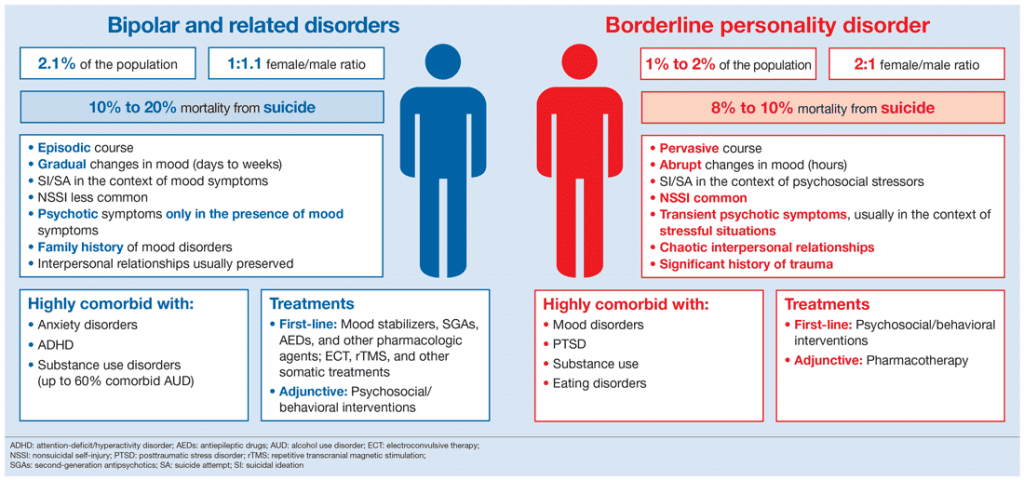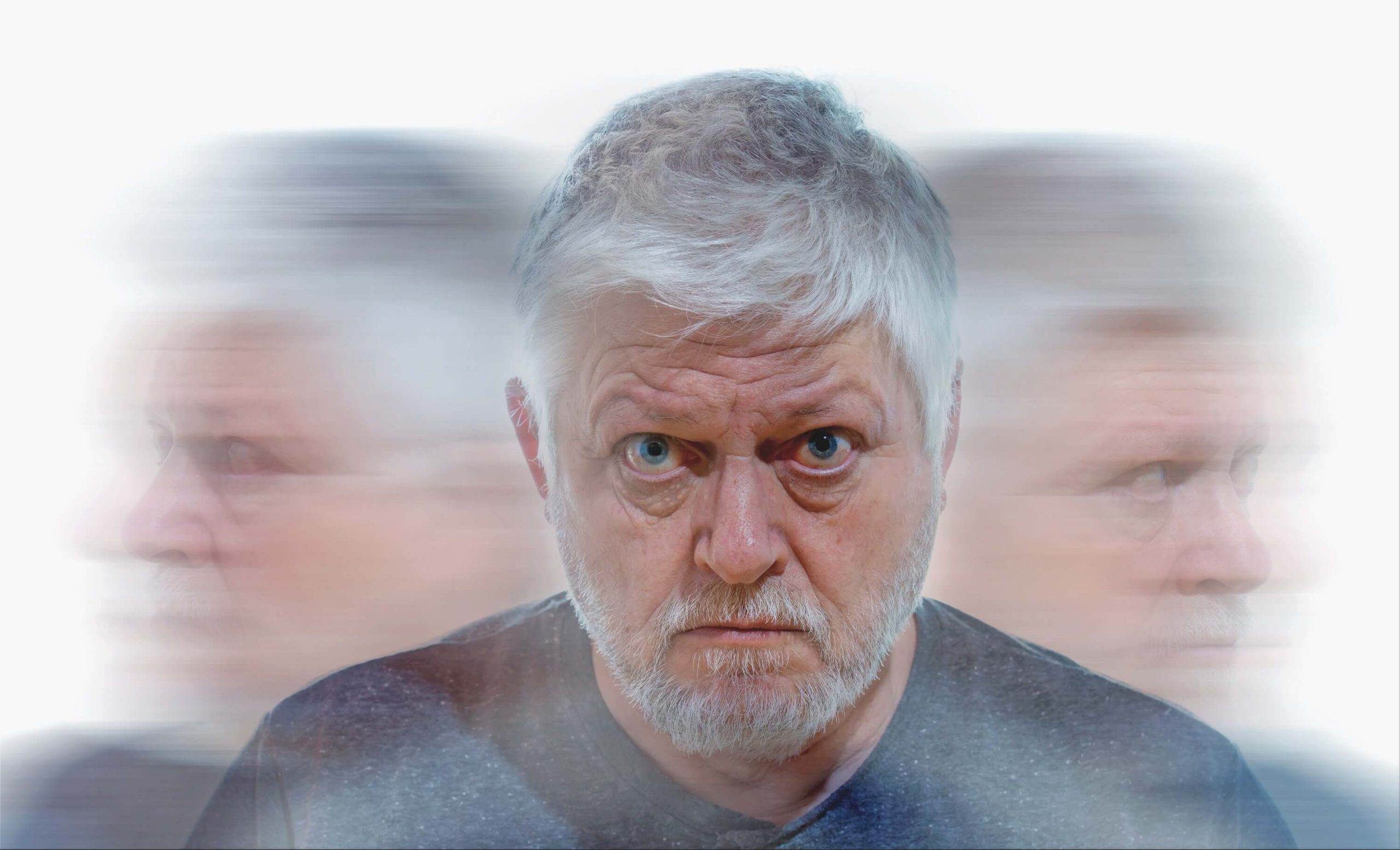Outpatient Treatment Programs. Bipolar Disorder: Symptoms And Treatment
Bipolar disorder is a mental health condition that causes drastic changes in an individual’s mood, energy, and ability to think clearly. It differs from the normal emotional up and downs that most people run into on occasion. People that have bipolar disorders experience extreme mood swings that have emotional highs, called mania, and lows of depression. The instability of the mood swings affects sleep, activity, judgment, and behavior, with a profound hold on the individual as a whole.
The average onset age of bipolar disorder is 25, but it can occur in teens as well as in childhood. According to the National Institute of Mental Health, about 2.5% of the U.S. population is diagnosed with bipolar disorder with nearly 83% of those cases classified as severe. If left untreated, bipolar disorder symptoms will usually worsen. However, recognizing the warning signs and being educated in the symptoms of bipolar disorder are the first steps in getting your life back on track.
Types of Bipolar Disorder
- Bipolar I Disorder can cause dramatic mood swings involving periods of severe mood episodes of mania to depression. There are usually periods of normal moods between episodes. Individuals will experience a manic episode with Bipolar I disorder.
- Bipolar II Disorder involves an individual having one major depressive episode and one hypomanic episode. A hypomanic episode refers to the same manic symptoms but less severe and only last up to four days in a row.
- Cyclothymic Disorder refers to chronically unstable mood swings with brief periods of hypomanic symptoms and depressive symptoms that are not as long-lasting as full episodes.
- “Mixed Features” or “Unspecified” Bipolar Disorder is when an individual does not meet the criteria for Bipolar I, II, or cyclothymic disorder but still experience periods of abnormal mood changes.
- “Mixed Features” or “Unspecified” Bipolar Disorder is when an individual does not meet the criteria for Bipolar I, II, or cyclothymic disorder but still experience periods of abnormal mood changes.
Symptoms of Bipolar Disorder
Symptoms of bipolar disorder will differ with each individual. Since there are different stages and forms of bipolar disorder, signs and symptoms vary from type to type as well. Some people may experience manic or depressed states in a rapid sequence while others may not show symptoms for extended periods of time.
Manic Symptoms
- Restlessness
- Unlimited energy
- Overly elated
- Easily distracted
- Talking fast/loud
- Impulsive and high-risk behavior
- Racing thoughts
- Not feeling tired
- Increased agitation
- Making grandiose plans
- High sex drive
- Unrealistic beliefs
- Inflated self-esteem
- Detachment from reality
Depressive Symptoms
- Intense sadness and despair
- Loss of interest
- Feeling restless
- Sleep disturbances
- Changes in appetite
- Loss of energy
- Suicidal thoughts
- The feeling of guilt and worthlessness
- Intense sadness
- Difficulty making decisions
- Anxiety
- Weight loss or gain
- Uncontrollable crying
- Fatigue
- Physical and mental sluggishness
- Memory problems
Causes of Bipolar Disorder
There is not a single cause of bipolar disorder, but research points to several factors contributing to bipolar disorder symptoms. This includes:
- Stress. Stress is a major component of most mental health disorders. A stressful event such as an illness, difficult relationship, a big move, the death of a loved one, and financial troubles can trigger a manic or depressive episode. This is why it’s so important for a person to manage stress effectively.
- Genetics. Research shows that when a person has a family member that has bipolar disorder, they are at an increased chance at developing the disorder. Although there is an increased chance, however, it is not guaranteed.
- Brain structure. Although brain scans cannot diagnose bipolar disorder, subtle differences in brain structure could contribute to the presence of bipolar disorder. The brain structures communicate with one another through chemical messengers called neurotransmitters. When the neurotransmitters aren’t communicating effectively, it results in abnormal brain function that contributes to mental illness such as bipolar disorder.
- Environmental triggers. When a person experiences symptoms of bipolar disorder, certain environmental triggers can set off manic and depressive episodes. Environmental factors such as a new relationship, starting a creative project, going on vacation, or a late night party could set off a manic episode. For a depressive episode, environmental triggers could include sleep deprivation, physical injury, a poor test grade, reading a sad book, and lack of exercise.
Bipolar Disorder Treatment
For those struggling with bipolar disorder, don’t hesitate to reach out for help. Treatment is possible. Simply ignoring the problem and living with untreated bipolar disorder only causes the issue to grow more severe, eventually taking over a person’s entire being. This includes trouble in careers, relationships, and even physical health. Fortunately, bipolar is highly treatable. The key is to be educated and identify the symptoms as soon as possible. Treatment will be different for everyone, but bipolar disorder is typically treated with a combination of therapy, medication, lifestyle adjustments, and support.
Bipolar IOP or PHP program is a serious endeavor, and we respect that you have overcome a lot of fears and uncertainties in deciding to engage in outpatient treatment. While there will always be elements of discomfort in any therapy regimen as we examine what you’ve experienced to help you move past it, we feel that the risks of further aggravating trauma that come with exposure therapy simply aren’t worth it. We believe in the Hippocratic Oath to “first, do no harm,” and will never willingly engage in therapeutic recommendations that don’t have a much stronger likelihood of helping than hurting you.
- Therapy. Both individual and group therapy methods are beneficial in treating bipolar disorder. Common therapy types including Cognitive Behavioral Therapy, Dialectical Behavioral Therapy, and family therapy provide the skills and tools needed to treat the symptoms of bipolar disorder. Effective therapy treatment will teach clients coping mechanisms, problem-solving techniques, and communication strategies.
- Medication. Common medications prescribed to treat bipolar disorder include antidepressants, mood stabilizers, and atypical antipsychotics. Medication alone is not the only way to treat bipolar disorder, but when used in combination with other treatment methods, is extremely effective in treating symptoms. A medical professional will evaluate the symptoms in order to prescribe the best medication for each individual.
- Lifestyle Adjustments. Healthy changes to a person’s lifestyle largely contribute to their recovery. This includes exercising regularly, a balanced sleep schedule, reducing alcohol and caffeine use. Keeping up with prescribed medications and practicing self-care aids tremendously in treating bipolar disorder.
- Strong Support System. Often times when someone is struggling with a complicated mental health disorder, they will feel isolated and alone. In order to prevent this, it’s crucial for the individual to have a strong support system. Along with a supportive family and friends, additional support can be gained from support and self-help groups. In-person and online support groups help people learn coping skills, gain acceptance, and avoid social isolation.
BPD VS BIPOLAR
BPD and Bipolar disorder are often confused. They both have symptoms of impulsiveness and mood swings. However, borderline personality disorder (BPD) and bipolar disorder are two separate disorders with different symptoms and treatments. Diagnosing a mental illness isn’t like diagnosing some physical illnesses—it takes a lot of observation and understanding to find the right diagnosis. It’s best to talk to your therapist for the right diagnosis. Both BPD and bipolar have good treatment options, but they are very different options, so putting time into getting a correct diagnosis is essential.

If you are living with bipolar disorder, help is out here. At Overland Intensive Outpatient, we would one on one with our clients to develop a treatment plan towards long-term recovery. It’s not uncommon for those with bipolar disorder to suffer from other co-occurring symptoms. Our treatment plans address all underlying issues to treat the entire mind, body, and soul. Don’t hesitate to reach out today. You are not alone in your struggle.


Overland IOP is a top rated mental health & addiction treatment Intensive Outpatient Center located in Los Angeles, California. Overland OIP offers individualized treatment for people seeking comprehensive services that encompass mental illness and/or co-occurring addiction. We accept most PPO and some HMO health insurance plans.
Overland Intensive Outpatient is ready to provide both, in-person and virtual care (telehealth services) to expand access to essential health services and meet the health needs of our patients. Start your treatment with Overland IOP today!
Our team at Overland IOP is dedicated to deliver a treatment experience beyond expectations. We pride ourselves on being highly-skilled professionals, dedicated to providing personal and exceptional care.
Published: January 15, 2021


Published: July 01, 2024
Understanding Bipolar Symptoms in Men
Bipolar disorder is a mental health condition characterized by extreme mood swings that include emotional highs (mania or hypomania) and lows (depression). While the disorder affects both men and women, the presentation of symptoms can differ significantly between genders. Understanding the specific symptoms of bipolar disorder in men is crucial for accurate diagnosis and effective […]
Read more

Published: June 23, 2024
How to Avoid Topical Steroid Withdrawal
Understanding Topical Steroid Withdrawal Topical steroid withdrawal (TSW), also known as Red Skin Syndrome or Steroid Addiction, is a condition that can occur after prolonged use of topical corticosteroids. These medications are frequently prescribed for skin conditions like eczema and psoriasis due to their effective anti-inflammatory properties. However, improper use or prolonged application can lead […]
Read more

Published: June 23, 2024
Understanding “IOP” Medical Abbreviation
IOP stands for Intensive Outpatient Program, a form of treatment that offers a structured therapy environment without requiring a residential stay. It is designed for individuals who do not require 24/7 medical supervision but still need regular support, making it a flexible yet effective option for those in recovery. Overland IOP in Los Angeles provides […]
Read more
